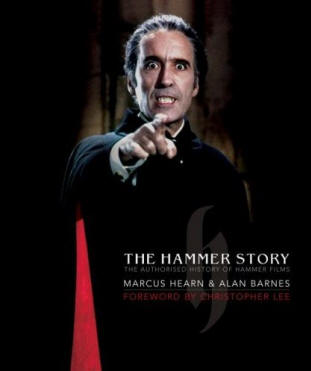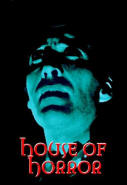|
 The Hammer Story is quite simply the book I
wish I had written – an easily digestible yet
informative text which gives a great overview of the
history of Hammer Films. Marcus Hearn and Alan Barnes
text first saw the light of day in 1997, emerging from
the ashes of Marvel’s Hammer Horror magazine – a splendid
publication that was killed off when Marvel restructured
its magazine department. The Hammer Story is quite simply the book I
wish I had written – an easily digestible yet
informative text which gives a great overview of the
history of Hammer Films. Marcus Hearn and Alan Barnes
text first saw the light of day in 1997, emerging from
the ashes of Marvel’s Hammer Horror magazine – a splendid
publication that was killed off when Marvel restructured
its magazine department.
Ten years
later, and after having been out of print for some time,
the book re-emerges in an updated 2nd edition
just in time for the 50th anniversary
celebrations of Hammer Horror. Available in two formats
the first a perfectly splendid hardback edition for £25;
or a limited edition of 600 leather-bound copies for a
princely £75. A little too expensive for me at that
price, and with a copy of the first edition on my shelf
is it really worth having three copies?
When asked
for recommendations on Hammer books, it is hard not to
suggest a half dozen or more titles now. Recent years
have been good to Hammer fans in terms of available
materials, but also contributing to an increasingly
cluttered market.
The Hammer Story should have the luxury of being
potentially a very public book – it is the authorised
history of Hammer (a fact acknowledged in the credits,
as copyright is shared between Hammer and the authors),
and is published by Titan, a major player in cult film
books.
As for
content, well the book intersperses short history
chapters accounting for the various stages in the
company’s development, alongside chapters on individual
films (usually two pages of production background
information and critical commentary). Throughout the
text is heavily illustrated, with rare stills and poster
images, images of props and so on. As a coffee table
tome, printed on glossy white paper, the imagery is
stunning and very attractive.
It is the
visual element which really stands
The Hammer Story out against the competition. A
great coffee table book, lavishly illustrated in colour
throughout. The images are sharp and arresting and great
care has been taken to get things right. Other books
like Meikle's
History of Horrors are bereft of illustrations,
whereas Wayne Kinsey's
two volumes are packed with hundreds of rare
photographs, but are in black and white and many
reproduced in micro-size. Hammer fans are a visual lot,
and why not? Film is a visual medium after all.
The book
has been substantially revised for this edition, and a
quick flick through certainly demonstrates that it
*looks* different. All of the illustrations have been
resourced, rescanned, are reproduced with better colour
and resolution. Many have been replaced too with
substantially different alternatives, which all help to
keep the book fresh. Textually things are a little
different.
The filmography has been substantially revised based on
new information from researches conducted over the last
decade. Particularly with those ambiguous Exclusive
titles, some have been weeded out, and in other
instances we now have cast and crew details, and lines
about the film content. It looks as if there's still
work to be done in the coming years on this element. The
bulk of the text in the book remains moreorless the
same. Tonal changes owing to the death of some of those
under discussion for example. Even Christopher Lee's
foreword remains the same. Such a pity that the
anniversary year could not have given us something
additional.
I've always been frustrated by the text's concentration
on the horror/fantasy films that Hammer produced, but I
accept that this is part of a marketing strategy, and
otherwise we'd end up with a book which may not be of
particular interest to the lay consumer. However, the
final chapter sums up the last decade in a couple of
paragraphs, and as the book was revised as a new
take-over was under way, following several unsuccessful
attempts at a return to production. Surely this should
have been explored further? But then one has to remember
that this is an official text, its purpose in part must
be to serve as an advertisement for the back catalogue
of the company. To explore the highs rather than the
lows. For that story one has to turn to the other Hammer
texts. And when that is borne in mind
The Hammer Story still proves itself to be an
essential purchase for every Hammer fan.
Take yourself to your local cinema and watch
Dracula on the big screen the way it was meant
to be seen. Get yourself online for the impending
arrival of
Beyond the Rave and get yourself down to your
local Waterstones or Borders and pick up your copy of
The Hammer Story and celebrate the ongoing life
of Hammer Horror....
© RJE Simpson 2007
review posted 23.10.2007 |


 -
-
